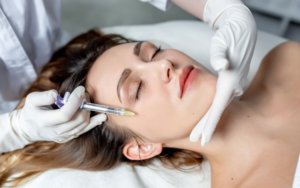As most people are aware, plastic surgery is not a new phenomenon. However, did you know that in Europe, the earliest’ nose jobs‘ date back to as long ago as the mid-1400s?
Thankfully plastic surgery techniques have come on leaps and bounds since those early, painful days. Nevertheless, the words’ plastic surgery’ and ‘botched’ are sometimes used in the same sentence. This is unfair on a profession that is a force for good. For example high quality plastic surgery is responsible for breast reconstruction after a mastectomy. Alternatively it is used to perform skin grafts in order to treat burns sustained in a car accident or an accident at work.
No, the word ‘botched, is more likely to be seen in tabloid headlines next to the phrase ‘cosmetic surgery’. That’s not to say that all cosmetic surgery goes wrong or that all cosmetic surgeons perform shoddy work.
Practitioners who carry out non-surgical cosmetic procedures such as administering Botox and dermal fillers do not have to be qualified at all. As of yet, there is still no regulation of this area of the cosmetic treatment industry.
In 2019 an All-Party Parliamentary Group (APPG) was established to inquire into advanced aesthetic non-surgical cosmetic treatments. Its report was published in July 2021. It concluded that the absence of any legal regulation on administering such treatments was a wholly unsatisfactory situation that could not continue. It urged the Government to take action to rectify the position. As of yet, the Government has not done so.
The difference between plastic and cosmetic surgery is that the former is a necessary medical procedure to repair damaged skin. The latter is undertaken by those who choose to have it to improve their appearance. Cosmetic surgery is said to be ‘elective surgery’, something an individual chooses to have and does not undergo out of necessity.
What are the most popular types of cosmetic surgery?
- Rhinoplasty
- Otoplasty
- Face /neck lift
- Fat Transfer
- Liposuction
- Browlift
- Breast Augmentation
- Breast reduction
- Otoplasty (ear surgery)
The most popular non-surgical procedures are:
- Botulinum Toxin (Botox) injections – frequently used to stop wrinkles from deepening
- Dermal fillers are used to make lips look more prominent and are an alternative to formal surgical nose jobs and facelifts.
- Chemical peels – a procedure to remove dead skin, leaving younger-looking skin showing.
Social media and the rise and rise of cosmetic surgery
According to a report carried by the CNBC news website, the never-ending increase in popularity of social media has significantly impacted the number of people seeking cosmetic surgery.
Social media platforms often use enhancing filters (i.e., filters that make lips appear bigger and cheekbones more prominent). Individuals who post selfies in the ‘Instagram stories’ feature sometimes use this type of filtering.
This significant upsurge in cosmetic procedures has been linked to a desire amongst some social media users to make themselves permanently look like they do when they use filters on social media to alter their photographed appearance digitally
What can go wrong following cosmetic surgery or cosmetic plastic surgery?
- The most common complaint after cosmetic surgery or a non-surgical procedure is that the result is not what was expected or desired.
- The patient is dissatisfied with the way surgery has changed their appearance.
- Hematoma – large amount of blood collecting in a pocket under the skin
- Seroma – similar to a hematoma, but is a build-up of bodily fluid that collects where tissue has been removed.
- infection
- Organ damage
- Nerve damage
- Scarring
Can you claim compensation for cosmetic surgery that goes wrong or a botched cosmetic procedure?
Cosmetic surgeons in the UK are qualified medical professionals. As such, they owe their patients a duty of care to provide them with care that conforms to the standard reasonably expected of a competent doctor.
This duty applies to the standard of surgery they carry out and the standard of care they provide in ensuring their patients know what to expect of the surgery they have chosen. Just because cosmetic surgery is elective surgery, this does not mean that they should go under the knife without being made fully aware, by their cosmetic surgeon, of:
- The procedure involved
- Any risks involved
- Whether there will be reactions to any products used during surgery.
Should things go wrong and the correct duty of care has not been provided, the patient who suffers from the effect of botched surgery may end up instructing a personal injury solicitor to bring a clinical negligence claim against the surgeon.
Individuals who are not medically qualified frequently perform non-surgical procedures, either operating alone or within ‘clinics’. As the present law stands, they are acting quite legally. Many perform these cosmetic procedures perfectly successfully.
However, whenever there is an absence of mandatory regulation in an industry, there is always a fear of negligent ‘workmanship’ creeping in, often with disastrous results. Just because an aesthetic practitioner is not medically qualified, it does not absolve them from getting sued in a dermal filler compensation claim or a Botox negligence claim.
How do you avoid being the victim of botched cosmetic surgery in the first place?
- Ensure that you know what you want the end result to be when you decide to have either cosmetic surgery or a non-surgical procedure.
- At the same time, have realistic expectations of what results can be achieved by undergoing surgery or non surgical procedure.
- Don’t seek out the cheapest option – seek out the best option. Cosmetic surgery is, by its very nature, not cheap. If one provider is much less expensive than another when providing a quote for the same type of cosmetic work, it should ring alarm bells.
- If you decide to undergo cosmetic surgery, check that the surgeon or clinic you propose to use is registered with the GMC (General Medical Council) or Care Quality Commission (CQC).
- Make sure the clinic offers you an initial consultation with the surgeon or doctor who will carry out the procedure. Get together a list of questions you want the medical expert to answer when you attend the consultation. You must understand all you can about the process and any risks involved. Don’t be afraid to ask the doctor how many times they have carried out the procedure you intend to have or how long they have practised in this field.
- Does the clinic provide aftercare? They should. Find out what that entails.
- If you feel uncomfortable about any of the answers they provide, then go with your gut feeling. You may decide this type of procedure is not for you after all. Alternatively, seek out another service provider and go through the same process until you are satisfied with your chosen expert.
If you decide to undergo non-surgical treatment from a practitioner who is not medically qualified, you should go through a similar vetting procedure as outlined above. However, remember that the provider is unlikely to be medically qualified ( though aesthetic nurses practising in private clinics will still need to be registered with the NMC). Some aesthetic cosmetic procedures are carried out by beauty therapists who are required to be qualified.
Drilling down on how experienced the practitioner is in carrying out the particular type of treatment you want to have will be even more critical when they have neither medical qualifications nor membership of a mandatory regulatory body.
Finally, whilst you would hope you’d not need to resort to litigation following a cosmetic procedure, you should nevertheless ensure that the doctor or practitioner undertaking the treatment carries third party indemnity insurance. If you are unfortunate enough to need to sue after cosmetic surgery, you at least want to know that the person or clinic responsible is good for any compensation you are awarded! Check the level of insurance too.






